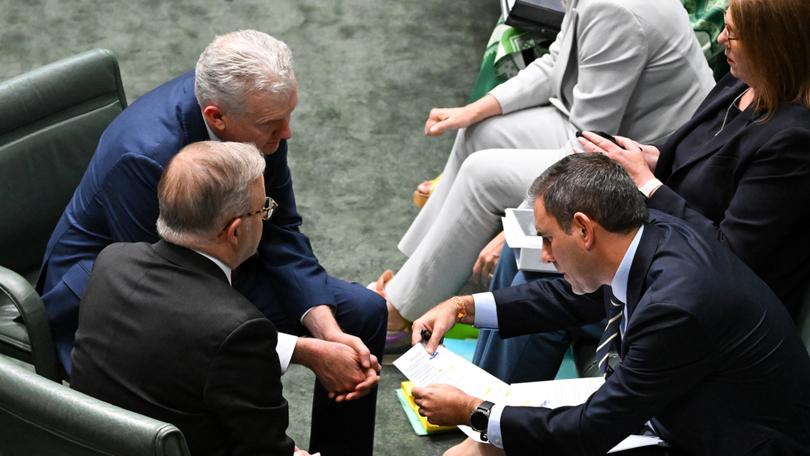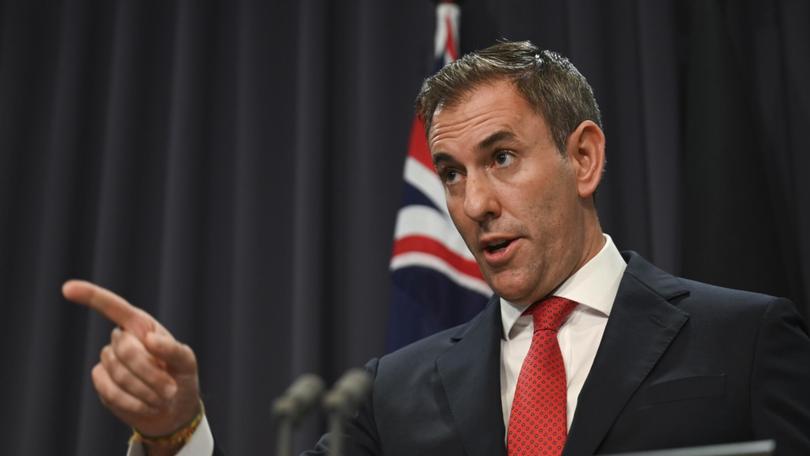ANDREW CARSWELL: Jim Chalmers wants to wake the economy from an induced coma of his government’s making
After 18 months of ideological frolics, the Government has suddenly stumbled headlong into the cold hard reality that there is an economy that actually needs to be nurtured and grown.

The wry smiles were so pronounced, they were near-audible.
Here was the Treasurer of Australia, addressing a room full of business leaders last week, defining in bleak language where the nation’s economy sat, and where things needed to change.
It wasn’t a pretty description. Nor was it a revelation for the leaders in the room, who have been warning the Government with such phrases ad nauseam for 18 months.
Sign up to The Nightly's newsletters.
Get the first look at the digital newspaper, curated daily stories and breaking headlines delivered to your inbox.
By continuing you agree to our Terms and Privacy Policy.Chalmers told guests at the Business Council of Australia dinner that the economy was “not productive enough, not competitive and not dynamic enough” and this would indeed “cost us if we don’t attend to it”.
It seems after 18 months of ideological frolics, the Government has suddenly stumbled headlong into the cold hard reality that there is an economy that actually needs to be nurtured and grown.
The shift in economic narrative is on in earnest.

This is a relieving development, and the Treasurer and PM Albanese certainly aren’t hiding this sudden pivot back to growth for fear of embarrassment, even in a room full of baffled business leaders.
Apparently it’s time to wake up the patient after the Government seemingly put the economy in an induced coma for 18 months while it performed some experimental surgery.
The final prognosis? Well, the body hasn’t taken too well to the treatment, hence Chalmers stepping up to the table, defibrillator in his hands.
But it’s OK. We are in a “new growth phase” now.
Economic growth is cool again. Inflation-busting is old hat.
But is it galling for a Treasurer to declare the Australian economy and business conditions are in such a dire state when his own Cabinet colleagues have aided and abetted the weakening?
This is a Government that from its first hour in power has taken a baseball bat to the most productive parts of the Australian economy, belting business in the name of populism, running down productivity, copying and pasting union IR manifestos and rushing them through Parliament, announcing extreme approval standards on development, intervening in complex gas and energy markets only to make things more complex, jacking up wages to unsustainable levels, and effectively chasing investment overseas into countries where worker conditions are below par and environmental standards are non-existent.
Yes, it’s a long sentence.
But it has been for the economy too.
Chalmers sits right beside Employment Minister Tony Burke in Cabinet. Did he ever lean across and have a frank conversation with Burke while he was wantonly damaging the Australian economy by legislating industrial relations “reforms” that will make Australia one of the most expensive and unproductive places to do business?
In one fell swoop, Burke made a phrase common parlance in board rooms around the nation and abroad: “Why on earth would we invest in Australia under these conditions?”
Not hyperbole.
Take BCA CEO Bran Black’s own words: “I could not begin to tell you how often I hear from CEOs the common point that they’re not quite sure, if they have got free cash, that Australia is the right place for them to invest.”
Our global competitiveness has been shattered. Investment and business confidence are in the mire.
But we are in a “new growth phase” now. Things are going to change around here, alludes Chalmers.
The problem is, the policy landscape that stretches to the horizon of the next election is littered with so many landmines for Australian business that it renders the Treasurer’s new (welcome) growth focus somewhat neutered.
If only economic growth could be manufactured by mantras, and not birthed in enabling and supportive economic policy.
So in the wry smiles of business leaders last week was not only a hark back to the bumpy road just travelled, but also an acknowledgement of what awaits on the road ahead.
Three seats down from Chalmers around the Cabinet table is Environment Minister Tanya Plibersek. Has he ever wheeled his chair down and had a candid chat with the Minister about the Nature Positive environmental approvals regime she is putting together, that risks adding another layer of red tape to business and further stifling investment? It’s not too late.
Because Nature Positive is in danger of being perverted to become Economy Negative.
Even throughout the debate on this exhaustive legislation, Nature Positive threatens to be a dead weight on growth; not just because of its content, but because crossbench senators and MPs are lining up to staple some alarming amendments to the laws, including a climate trigger.
Add the changes to the PRRT regime, extended environmental standards for offshore gas, the announcement of a 2035 emissions reduction target, and a vehicle emissions policy and you have at least six to 12 months of destabilising debate between Labor and the Greens about how hard or soft they are going to flog business.
The only certainty? A flogging.
One can only hope that when crafting the upcoming Budget, Chalmers had one of his new phrases rumbling around his head.
“Fundamentally, we need to concentrate on making Australia a more competitive place within which to do business.’’
True.
Now, go and tell your fellow Cabinet ministers.
Andrew Carswell is a political strategist and former adviser to the Morrison government.
